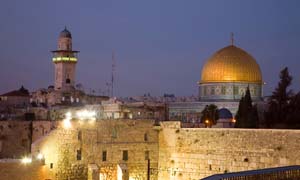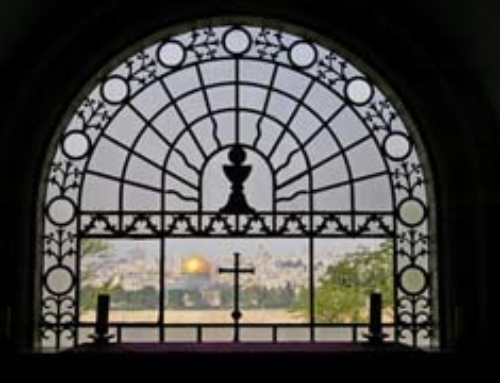By: Saulat Pervez
Golden Age of Jewish Tolerance in Muslim Spain
When the Muslims conquered Spain in 711 C.E., Jewish people were relieved from the persecution of their Visigoth Christian rulers and enjoyed a time of full religious liberty. While they had survived centuries of marginalization under Christian rule, the dawn of tolerance in Muslim Spain enabled them to thrive. Thus began a period of nearly 800 years of singular achievements for the Jewish people.
As protected non-Muslims, or dhimmis, they paid an annual tax (jizya) of one golden dinar per capita1 , and conducted their affairs according to their own legal systems and social services. Their numbers increased as Jewish people from Africa flocked to the Iberian Peninsula.
Prophet Muhammad’s Peaceful Treatment of Jews
This, however, was not the first time Muslim and Jewish history intertwined. In fact, Muslim interaction with the Jewish people began ever since the advent of Islam. Prophet Muhammad, peace be upon him, negotiated treaties with the Jews of Madina after migration. When Palestine was conquered by the Muslims in 637 C.E., Umar, the second caliph of Islam, allowed the Jewish people to practice their religion freely and live in Jerusalem, for the first time in 500 years since their expulsion from the Holy Land. The Jewish people formed academies in Iraq in the 10th century, spreading a unification of theological thought. They called this early time the period of Excellencies. [Read more: Umar the Great]
How the Islamic Empire Brought Relief to Jews
In A Short History of the Jewish People (Oxford University Press, 2000), Scheindlin writes,
“Most of the Jews in the world were now inhabitants of a single Islamic empire stretching from the Indus River in the east to the Atlantic Ocean in the west, including Spain. This development brought the Jews of Palestine, Egypt, and Spain nearly instant relief from the persecutions, harassment, and humiliation that they endured under hostile Christian rule. It also brought them, for the first time since the beginning of the Diaspora, into a single cultural, economic, and political system. Both these new conditions would enable them to flourish and to create the most successful Jewish Diaspora community of premodern times.”
This prosperity took shape within the Golden Age of Muslims, providing all and sundry, Muslim and non-Muslim, an opportunity to create, produce, invent, and innovate. This spirit was most apparent in Muslim Spain, heralding an era during which the Jewish people truly enjoyed their Golden Age.
Muslim-Jew relations in Spain: The Beginning
“In that long interval between the arrival of Tariq in 711 and the reconquest under Queen Isabella in 1492, the unique mix of al-Andalus will produce marvelous innovations in architecture, music, literature, philosophy, medicine, and science,” writes Michael Hamilton Morgan in Lost History (National Geographic, 2007).
How the Jewish People Prospered in Muslim Spain
According to Wikipedia,
“Especially after 912, during the reign of Abd-ar-Rahman III and his son, Al-Hakam II, the Jews prospered, devoting themselves to the service of the Caliphate of Cordoba, to the study of the sciences, and to commerce and industry, especially to trading in silk and slaves, in this way promoting the prosperity of the country. Jewish economic expansion was unparalleled.
“In Toledo, Jews were involved in translating Arabic texts to the romance languages, as well as translating Greek and Hebrew texts into Arabic. Jews also contributed to botany, geography, medicine, mathematics, poetry and philosophy. During ‘Abd al-Rahman’s term of power, the scholar Moses ben Enoch was appointed rabbi of Córdoba, and as a consequence al-Andalus became the center of Talmudic study, and Córdoba the meeting-place of Jewish savants.”
Famous Jewish Figures of the Golden Age of Muslim Spain
From this period, the Jewish people celebrate Judah Halevi (poet, philosopher), Ibn Ezra (theologian), Moses de Leon (mystic), among many others. The best-known Jewish figure of this time is Musa ibn Maymun, known as Maimonides, who was born in Cordoba in 1135. Fluent in Arabic, Hebrew and Spanish, he spent his childhood in Cordoba. However, when an intolerant caliph took over, Maimonides and his family migrated from Spain. Interestingly, they chose to relocate not to Christian Europe but to Muslim North Africa. After studying medicine in Fez, Morocco, he decided to live in Cairo. “He and his family know that people of major urban centers of Islam are more tolerant and intellectually open than anyone in 12th-century Europe,” remarks Morgan. Maimonides was a doctor, a political advisor, philosopher and theologian.
Rabbi Hasdai ibn Shaprut rose to the second highest political position as de facto vizier and foreign minister under Caliph Abd-ar-Rahman III. Maimonides became court physician to the grand vizier in Cairo and later for Sultan Saladin, that famous paragon of tolerance. [Click here to learn more about Islam in Europe.]
Final Stages of the Golden Age
The Golden Age began its end when the caliphate began to dissolve and Jewish freedom became restricted. Flash occurrences of violence also took place. For instance, the massacre of Granada in 1066 claimed the lives of 150 Jewish families, and the invasion of the Almoravids and Almohads in the 12th century meant harsher and intolerant treatment of Jewish people.
“But as much as or more than they are at odds or in conflict, the three groups [Muslims-Jews-Christians] will also coexist, and sometimes cross-fertilize one another, and quietly respect and even honor their rivals. … Alfonso the Wise will adopt the tri-religious model of the Umayyads, with Muslim and Jewish advisors at his side. Arabic inscriptions will continue to adorn Christian churches and Jewish synagogues long after the Umayyad caliphate has fallen,” writes Morgan.
Jewish Centers of Science and Philosophy Flourished in Provence
During this uncertain period, the Jewish people went to Christian-ruled Toledo and participated in the School of Toledo, translating major Arab works into Latin. They also settled in Provence, another Christian pocket, which became a Jewish center of science and philosophy. Large-scale Jewish translations of Arab works were sponsored by local patrons and the Jewish people functioned as intermediaries between Christians and Muslims.
Jewish vibrancy continued in the Iberian peninsula until they were expelled en masse in 1492 by Queen Isabella. At this critical juncture, the Ottoman Turks came to their rescue by welcoming them into their empire. “Ottoman Turkey is one of the last incarnations of the sweet coexistence of many faiths that has flourished at times throughout the Muslim world,” Morgan states. This explains the sizeable Jewish communities of Turkey and North Africa in later years.
The Decline of Muslim Tolerance: How the Israeli-Palestinian Conflict Overshadowed Shared History
In fact, Christians and Jewish people also lived all across the Muslim world during the 15th and 16th centuries. While large minorities of Christians remained in Egypt, Iraq, Syria, and India, sizeable Jewish communities thrived in cities in Egypt, Iran, Morocco and other parts of North Africa.
However, as the Islamic empire began to decline so too did the relations between Muslims and Jewish people. As a result of the downfall of Muslim rule, the rise of modern nationalism, and Zionism (among other factors), our current interaction is overshadowed by the Israeli-Palestinian conflict. It is truly unfortunate that our shared glorious past has led to such a fractious present. In conclusion, one can only hope that our fates will hold a much brighter and more tolerant future.
Non-Muslims at a disadvantage in a Muslim country, how does Islam and Shariah treat people of other faith in an Islamic State? Dr. Muzammil Siddiqi, chairman of Fiqh (Islamic Law) Council of North America corrects misconceptions about Shariah
1 This tax, levied on able-bodied males, entitled them to state protection and exempted them from military service. The rulers used it to pay the salaries of state servants, pensions, and on charities. Critics often point to jizya as an example of discrimination against non-believers within Islamic law. In fact, the concept of jizya in Islam is in lieu of zakat, an obligatory religious tax for Muslims. The zakat money is used for various public services which both Muslims and non-Mulsims benefit from. Sayyid Sabiq mentions in Fiqh-us-Sunnah (Islamic Jurisprudence) that “Islam has legislated jizya (a tax) on non-Muslims living under Islamic rule, in counterpart to legislating zakat on Muslims, so that the two groups are equal (in obligations). This is because both live under the same banner and both enjoy all the rights and benefits from the services provided by the state in exactly the same manner.”
Got Questions?
We have Answers. Get in touch now.








